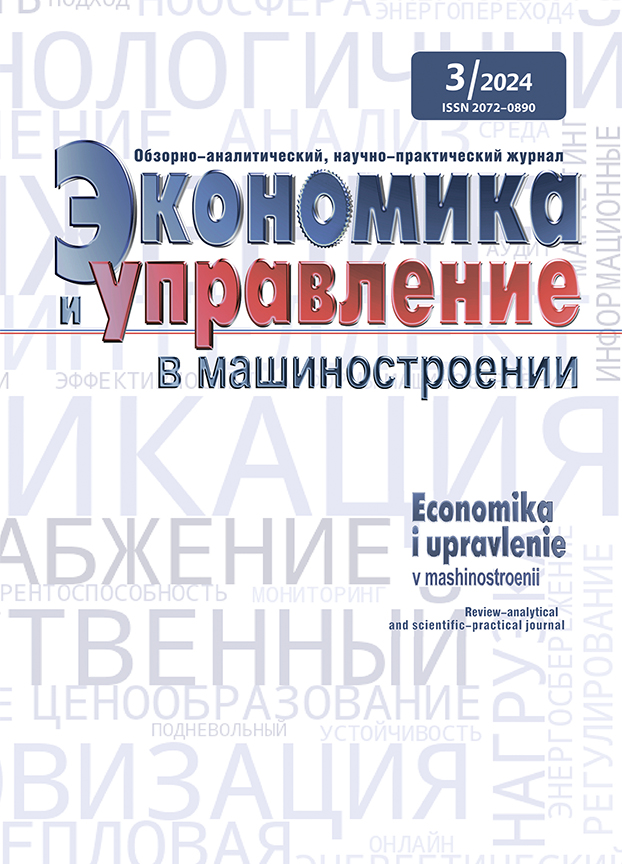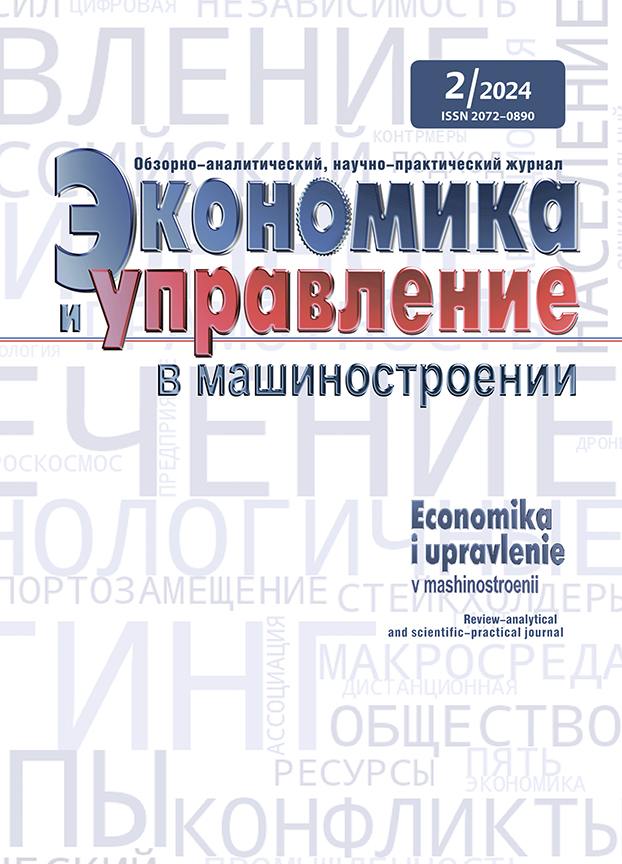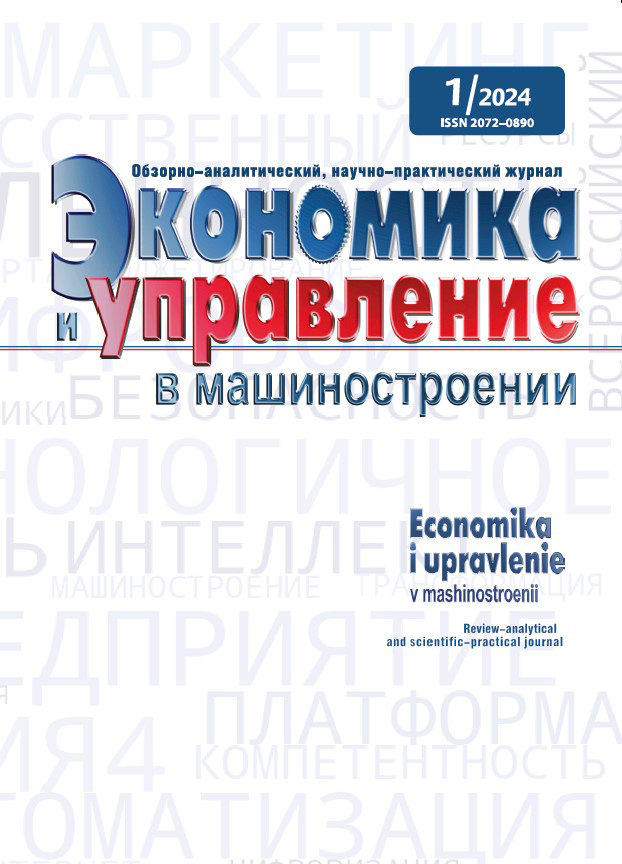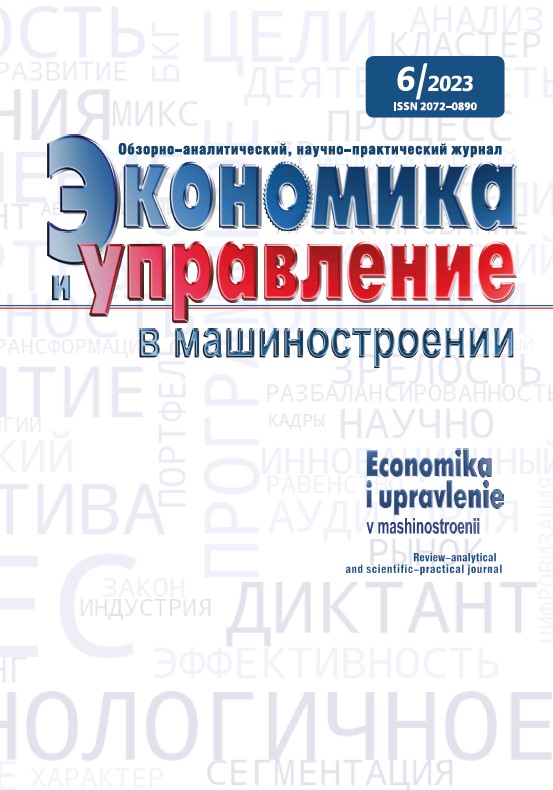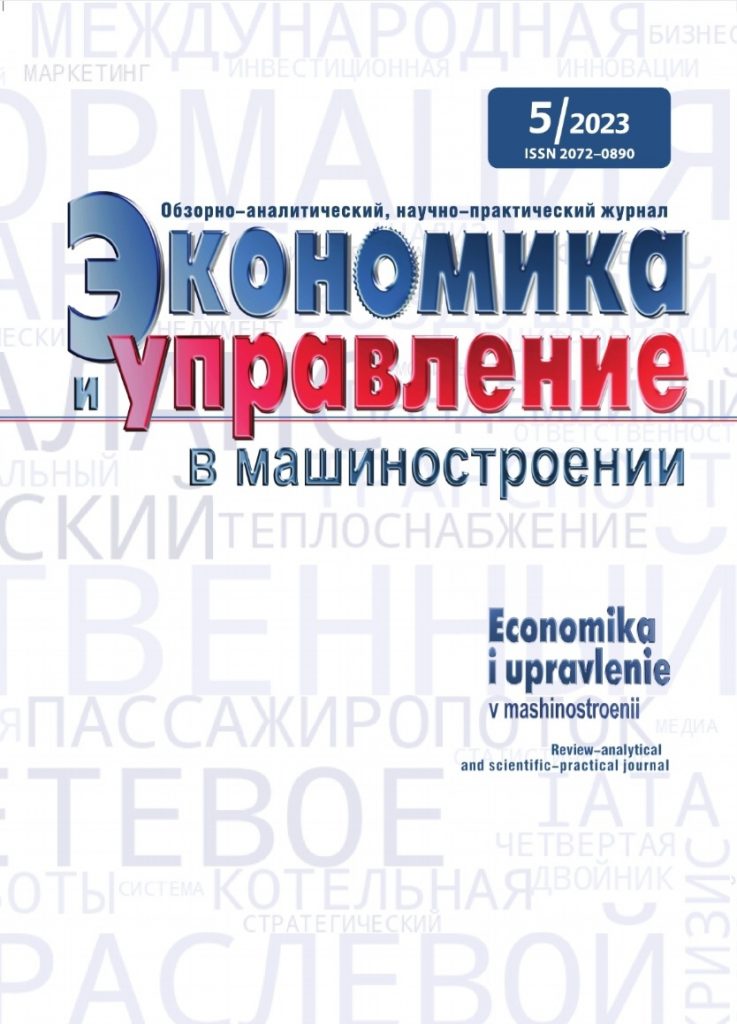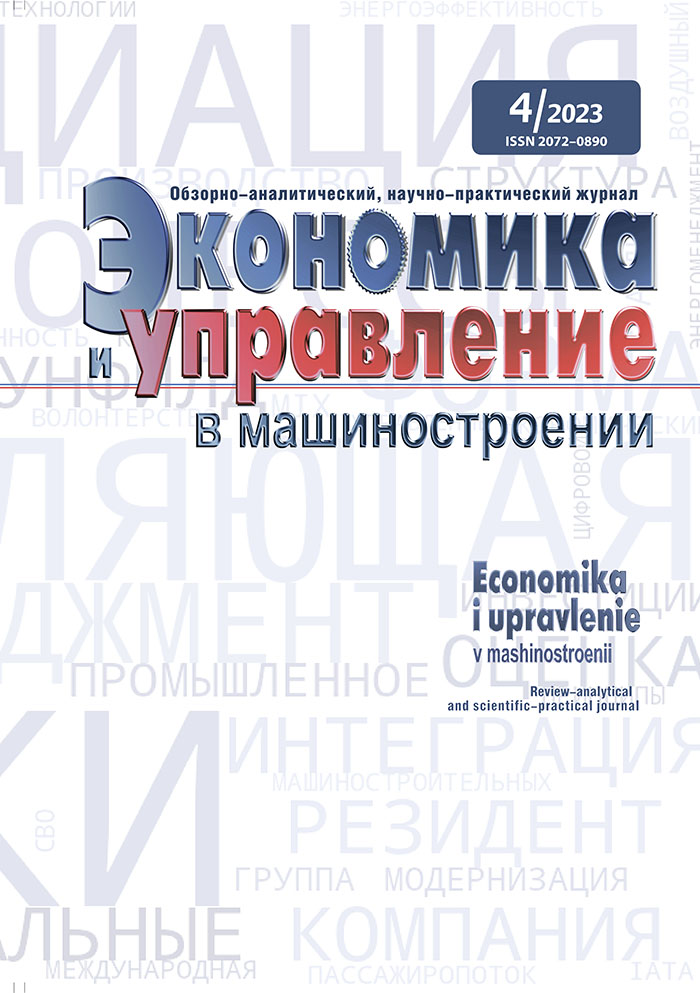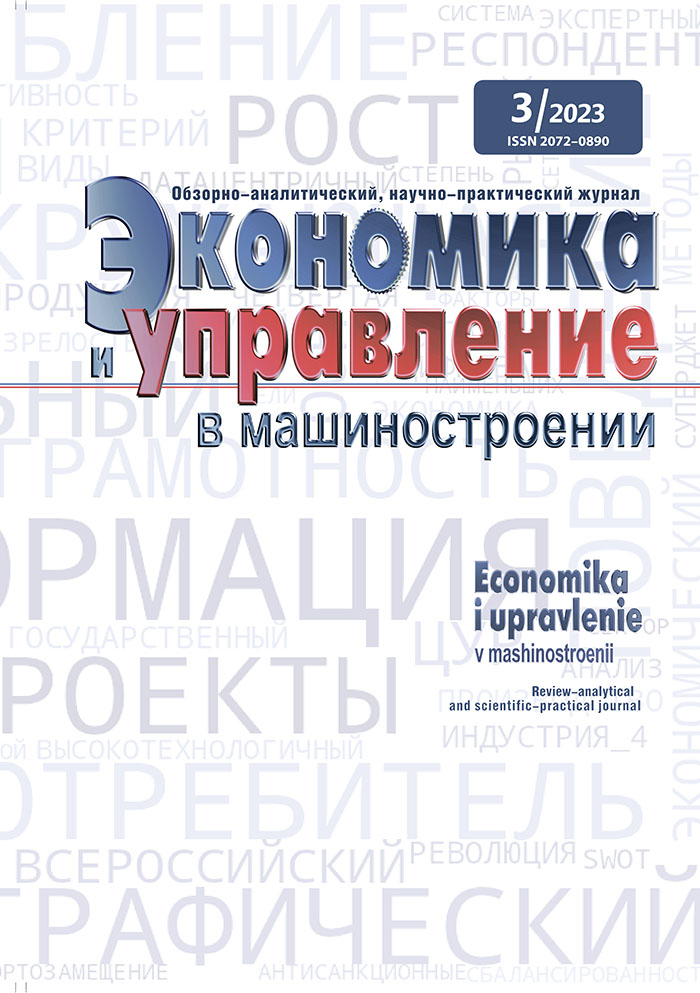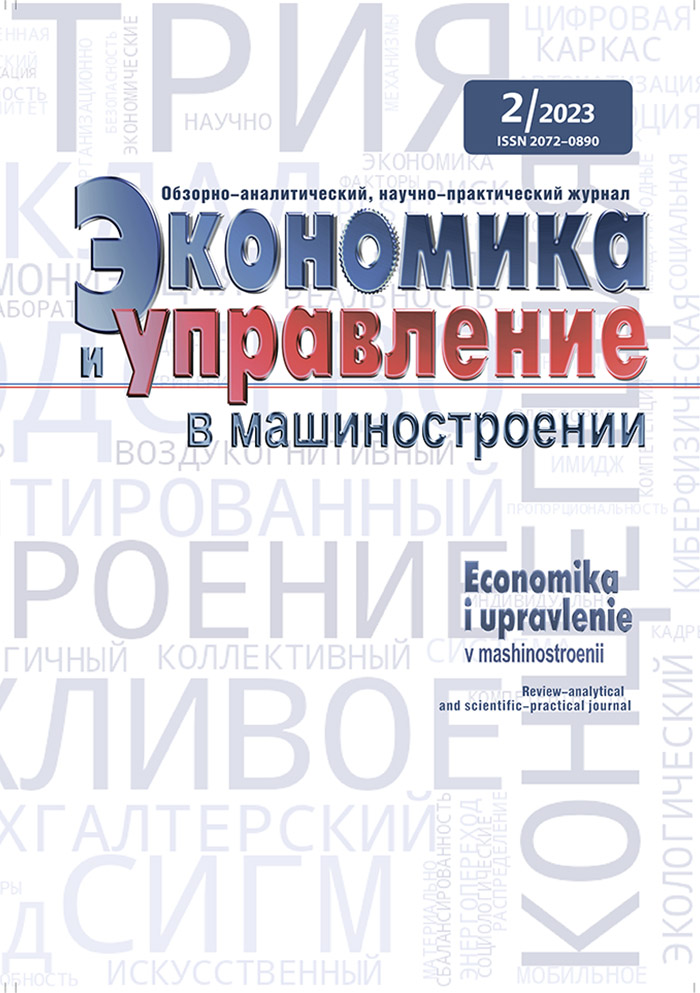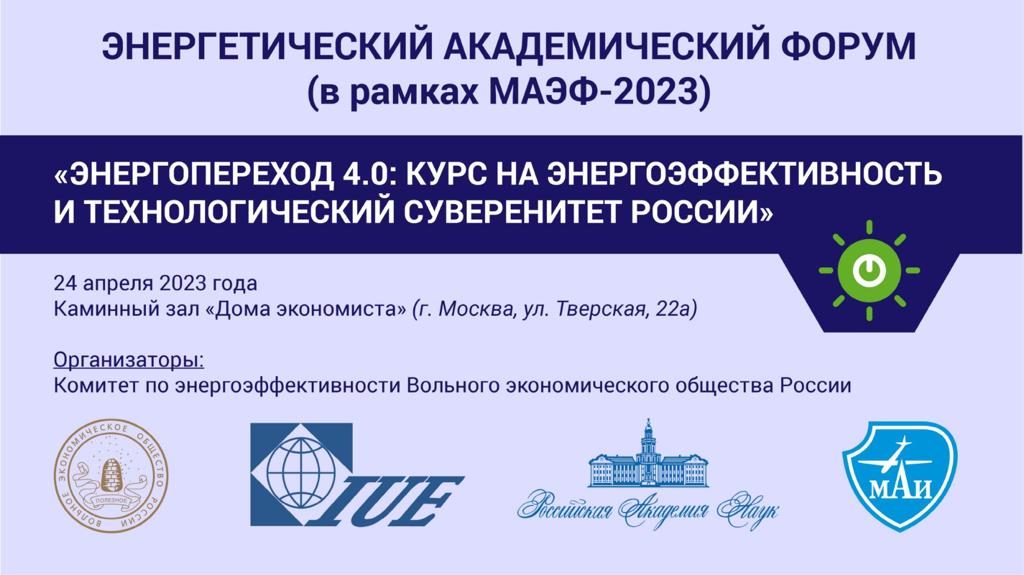OPERATION OF BUSINESS, INDUSTRIAL ENGINEERING
Identification of group conflicts within the framework of command-coalition management at high-tech enterprises
Vartanyan A. A., candidate of Physical and Mathematical sciences, doctor of Economic sciences, professor at the Management and marketing of high-tech industries Department
Moscow Aviation Institute (National Research University), Moscow
Abstract:
The scientific article is devoted to the study of group conflicts within the framework of command-coalition management at high-tech enterprises, in order to develop practical recommendations for ensuring their sustainable development in the context of the digitalization of society and the increasing frequency of political and economic crises. The main areas of conflict between the formal administration of the enterprise and coalition teams that have their own goals and management capabilities are identified.
The results described in the article can be used by high-tech enterprises that are interested in the identification of group conflicts within the framework of command-coalition management, as well as in decisions regarding their prediction and resolution.
Keywords: group, team, command-coalition management of a high-tech enterprise, conflicts between groups and within them
Principles of project management in the Roscosmos State Corporation. Part 1
Korsakov S. V., postgraduate student1, an active test cosmonaut of the Cosmonaut detachment2
1 – Moscow Aviation Institute (National Research University), Moscow
2 – Roscosmos State Corporation, Moscow
Smirnov V. G., doctor of Economic sciences, professor at the Management and marketing of high-tech industries Department
Moscow Aviation Institute (National Research University), Moscow
Abstract:
The article describes the main provisions of the project approach in the Roscosmos State Corporation, the process of formation of the project approach and its development including the USSR and Russia.
Keywords: project approach, Roscosmos State Corporation, project management, Gantt schedule, Project Management Association
Organizational support for remote employee work
Kuznetsova E. Yu., doctor of Economic sciences, professor
Ural Federal University named after the First President of Russia B. N. Yeltsin, Yekaterinburg
Podolyak O. O., candidate of Economic sciences, associate professor
Ural Federal University named after the First President of Russia B. N. Yeltsin, Yekaterinburg
Kuzmin V. V., postgraduate student
Ural Federal University named after the First President of Russia B. N. Yeltsin, Yekaterinburg
Abstract:
The article examines the prospects of remote employment, activated in the context of restrictive measures during the COVID-19 pandemic and developed by the subsequent transformation of the labor market as a whole. The methodology of analysis and synthesis of conclusions presented in scientific publications and processing of data from a questionnaire survey of respondents selected at random was used. The analysis of the opinions of representatives of the labor market employed in various sectors of the economy on the remote format of the working time and space organization is presented. Conclusions are drawn on certain aspects of traditional and remote workplace organization methods. The existing technological solutions for the organization of remote work of employees are considered. A generalized conclusion is given on the positive prospects for the development of the remote format of work.
Keywords: remote work, organizational support, organization personnel, labor organization, technologies for organizing work processes
MARKETING, SALES APPROACH
Practical aspects of omnichannel marketing realization at high-tech industrial enterprises
Samsonov P. M., мaster student
Financial University under the Government of the Russian Federation, Moscow
Sorokina E. A., student
Moscow Aviation Institute (National Research University), Moscow
Emelyanov D. A., student
Moscow Aviation Institute (National Research University), Moscow
Abstract:
The article is devoted to the study of the essence and practical aspects of implementing omnichannel marketing. The authors analyze the existing definitions of the term «omnichannel marketing» within the Russian scientific domain. Fundamental principles for implementation of the omnichannel marketing in a high-tech industrial enterprise are formulated. Practical aspects of implementing omnichannel marketing are explored, along with the software used in this context.
Keywords: marketing, omnichannel marketing, marketing communications, high-tech industrial enterprise, digital economy, marketing activity automation
QUALITY PRODUCTION, COMPETITIVENESS
Effective management of material resources as a tool to increase the competitiveness of the aviation industry and technological independence during the period of import substitution
Kaybeleva V. R., master
Moscow Aviation Institute (National Research University), Moscow
Mezina N. A., candidate of Economic sciences, associate professor at the Management and marketing of high-tech industries Department
Moscow Aviation Institute (National Research University), Moscow
Abstract:
This article examines a role of effective management of material resources in increasing the competitiveness of the aviation industry and achieving technological independence during the period of import substitution. The article is based on research and practical experience in the aviation industry and offers recommendations for improving competitiveness and technological independence in the context of import substitution.
Keywords: technological independence, import substitution, competitiveness, aviation industry, material resources, domestic production
INNOVATIVE INVESTMENT ACTIVITY
The application of an integral indicator in economics (on the example of complex rating assessment of investment attractiveness)
Golov R. S., doctor of Economic sciences, head of the Management and marketing of high-tech industries Department
Moscow Aviation Institute (National Research University), Moscow
Abstract:
The current study is focused on the investigation of the application of an integral indicator in modern economics. Author presents his experience in utilizing the integral indicator to calculate a comprehensive rating assessment of the investment attractiveness of companies from the electric power industry. The study provides a rating of 10 electric power companies formed using the integral indicator. The positions of authoritative representatives of economic science, expressed by them within the framework of a scientific discussion devoted to the rating compiled by the author, are reflected. Both the advantages and disadvantages of the integral indicator, which must be taken into account in the case of its practical application, have been examined.
Keywords: economy, efficiency assessment, integral indicator, rating, expert assessments, weighting coefficients
FOREIGN EXPERIENCE
Standard approach to risk management in international projects on the example of the initiative “One belt and one road”
Zhou Run, postgraduate student of the Economics and tourism Institute
Vladimir State University named after Alexander and Nikolay Stoletovs, Vladimir
Rodionova N. V., doctor of Economic sciences, professor at the Management and marketing Department of the Economics and tourism Institute
Vladimir State University named after Alexander and Nikolay Stoletovs, Vladimir
Abstract:
The problem about risk management in international projects is investigated on the example of the project for the construction of the transnational high-speed railway system “Asia – Europe”, which is a part of the “One Belt and One Road” initiative. Based on the standard approach, the provisions developing the theoretical and methodological foundations of project risk management are substantiated. Based on them, the main project risks are identified, their probabilities and levels are assessed, risk management strategies and tactics are recommended, as well as the countermeasures to reduce them. The current leads to continue studying of this problem are determined.
Keywords: “Belt and road”, risk in project, project risk management system and methodology, countermeasures
ANALYTICAL RESEARCH
Application of macro environment analysis for a steel company
Zemlyanskaya N. B., candidate of Economic sciences, assistant professor at the Management and marketing of high-tech industries Department
Moscow Aviation Institute (National Research University), Moscow
Kazakova N. V., candidate of Economic sciences, assistant professor at the Management and marketing of high-tech industries Department
Moscow Aviation Institute (National Research University), Moscow
Abstract:
This article considers a number of methods used in order to analyze the external environment of a company in the steel market. Namely: stakeholder matrix, Porter’s Five Competitive Forces methodology, PEST analysis. The acquired results of analysis are successfully used by the companies to develop effective marketing strategies, maintain market leadership, minimize risks and take advantage of emerging opportunities.
Keywords: macro environment, Russian steel market, stakeholders, Porter’s Five Forces, PEST analysis
Analysis of the current commercial UAV market in Russia
Shadrina L. V., deputy director of the Marketing center
Moscow Aviation Institute (National Research University), Moscow
Abstract:
The development of the UAV market is one of the most important area in Russia. The research introduces the evaluation of the current status of the hardware manufacturers in the Russian market. The drone market is considered as an established ecosystem, that includes hardware, applications, parts and software. The manufacturers of hardware are among the important elements of the ecosystem.
Analysis of the ecosystem allows us to take into account the impact of the suppliers and the customers on the UAV market. Analysis of the different regions allows us to identify the most advanced regions for localization of some ecosystem elements for development of a drone market.
The drone market either in the world or in Russia develops very fast, and it is necessary to both analyze and estimate not only the current status of the market, but also the stages that have been already passed. This analysis provides us with the hypothesis related to the drivers and barriers of the market.
Keywords: Drones, UAV, unmanned aerial vehicle, drone ecosystem, drone hardware, drone software, drone market map

